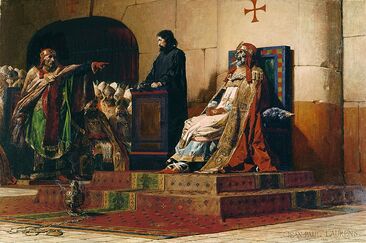 "Watch out for false prophets. They come to you in sheep's clothing, but inwardly they are ferocious wolves. By their fruit you will recognise them." Matthew 7:15-16 CORRUPTION STEPHEN VII (896-897AD) "He dug up a Corsican predecessor, Pope Formosus (891-896), when he had been dead for over nine months. He dressed the stinking corpse in full pontificals, placed him on the throne in the Lateran and proceeded to interrogate him personally.After being found guilty, the corpse was condemned as an anti-pope, stripped and minus the two fingers with which he had given his fake apostolic blessing, was thrown into the Tiber." (Vicars of Christ - the Dark Side of the Papacy by Father Peter de Rosa).
0 Comments
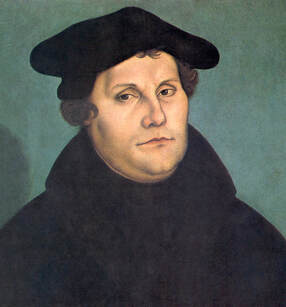
To view this article as a PowerPoint, click here.
To view this article as a video, click here. To listen to the audio of this article, click here. The Reformation was one of the most momentous turning points in world history. It was led by men of strong faith, deep convictions, great intelligence, high moral standards and tremendous courage. Towering above all these great Reformers, Martin Luther stands out as the most courageous, controversial and influential Reformer of all time. The Controversial Luther has been alternatively described as the brilliant scholar who rediscovered the central message of the Bible, a prophet like Elijah and John the Baptist to reform God’s people, the liberator who arose to free his people from the oppression of Rome, the last medieval man and the first modern man. Zwingli described him as: “the Hercules who defeated the tyranny of Rome.” Pope Leo X called Luther: “A wild boar, ravaging his vineyard.” Emperor Charles V described him as: “A demon in the habit of a monk!” The Son Martin Luther was born 10 November 1483 in Eisleben, Saxony. His father, Hans Luder, had worked hard to climb the “social ladder” from his humble peasant origins to become a successful copper mining entrepreneur. Hans married Margaretha Lindemann, the daughter of a prosperous and gifted family that included doctors, lawyers, university professors and politicians. Hans Luder owned several mines and smelters and he became a member of the City Council in Mansfield, where Martin was raised, under the strict discipline typical of that time. 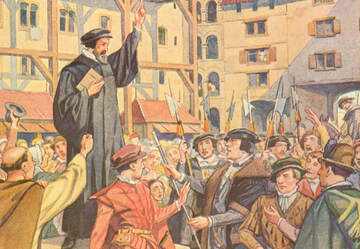
To Listen to an Audio of this Presentation of this Article, click here
A Man of Action Guillaume Farel (1489-1565) was a dynamic man of action who gave his whole life to spreading the Gospel of Christ. Farel was one of the most important leaders of the French Reformation from its beginnings. By Grace Alone While studying under Professor Jacques Lefevre at Sorbonne University in Paris, Farel came to faith in Christ. Professor Lefevre had published a Latin translation of, and commentary on, The Epistles of St. Paul. As he taught that it is God who saves by grace alone, Farel said his eyes were opened and his heart believed. Leader of the French Reformation When Luther’s Reformation writings came to France, Farel was one of the most prominent leaders in the French Reformed movement. When persecution forced him to flee from France in 1523, he became the leader of a group of evangelists who preached in French speaking Switzerland. Winning Switzerland to Christ Farel’s energetic efforts were central in opposing Catholicism and promoting the Protestant Reformation in Basel, Bern, Lausanne and Geneva. Everywhere he proclaimed the supremacy of the Scriptures and the need to return to a purified faith, which was based on the Bible alone. With great skill in debating and evangelistic zeal, Farel succeeded in winning most of French speaking Switzerland to the Protestant Faith. 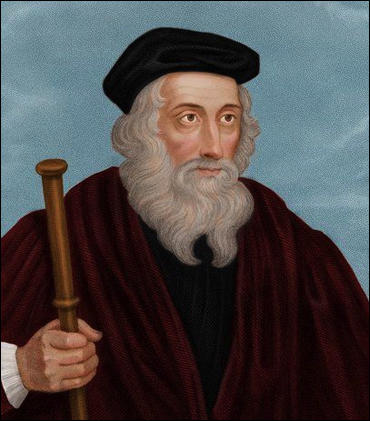 In the 14th Century, Oxford was the most outstanding university in the world and John Wycliffe was its leading Theologian and philosopher. The Black Death (the Bubonic Plague), which killed a third of the population of Europe, led Wycliffe to search the Scriptures and find salvation in Christ. The King’s Champion As a professor at Oxford University, Wycliffe represented England in a controversy with the pope. Wycliffe championed the independence of England from Papal control. He supported King Edward III’s refusal to pay taxes to the pope. (It was only one step away from denying the political supremacy of the pope over nations to questioning his spiritual supremacy over churches). The royal favour which Wycliffe earned from this confrontation protected him later in life. Wycliffe’s patron and protector was John of Gaunt. This English prince was the most powerful political figure in late 14th Century England. Gaunt, known in his day as the Duke of Lancaster, was effectively the Prime Minister of England during the last years of the 50-year reign of his then senile father, King Edward III. Gaunt was “a wise diplomat, a bold soldier, the epitome of chivalry, hard on his enemies and always faithful to what he believed was best for England.” In 1399 Gaunt’s son ascended the throne as King Henry IV. 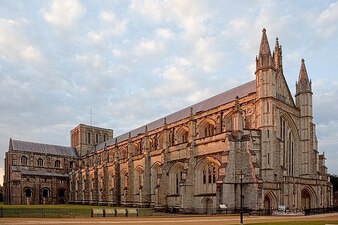 Excellence in Engineering Even secular architects and engineers have to admit that the greatest examples of excellence in architecture are the cathedrals. Extraordinary Sacrifice and Dedication When you consider the limited technological resources available to architects, builders and craftsmen, who built the medieval cathedrals - with wooden scaffolding, hand tools and boats that transported the stones from quarries to the building sites, each of these cathedrals represent staggering sacrifices and amazing achievements. Awesome Architecture Many of the great cathedrals of Britain were built a thousand years ago! These cathedrals are far more than monuments to a vibrant and living Faith. They have been meeting places for generations of Christian communities, the focal point of Christian work and witness throughout the Middle Ages to the present day. 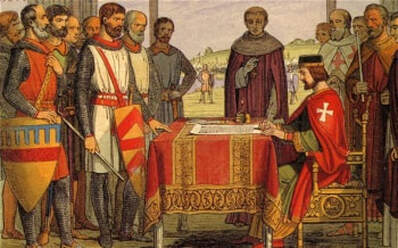
To view this as a video, click here.
To view this as a PowerPoint, click here. To listen to the audio, click here. "…I will make you a great nation; I will bless you and make your name great; and you shall be a blessing…and in you all the families of the earth shall be blessed.'" Genesis 12:1-3 Most Valuable 15 June marks the 804th anniversary of the proclamation of Magna Carta. Magna Carta has been one of the most valuable exports of Great Britain to the rest of the world. Magna Carta has truly blessed all the families of the earth. Magna Carta was the first Statute, the first written restriction on the powers of government. |
Categories
All
Archives
October 2022
|
 RSS Feed
RSS Feed